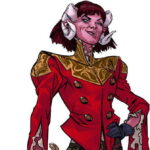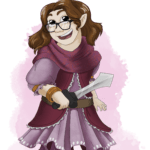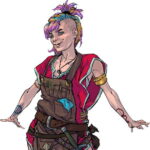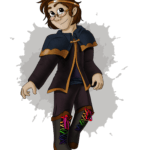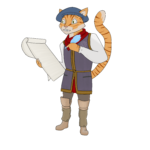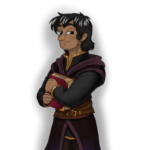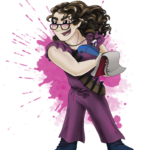Pandora Frost
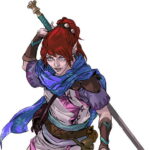
Pandora Frost (Monk)
Medium Humanoid (Half-Elf), Lawful Good
Cisgender woman (she/her)
Armor Class: 16
Hit Points: 27
Speed: 40 ft.
| Strength | Dexterity | Constitution | Intelligence | Wisdom | Charisma |
| 16 (+3) | 18 (+4) | 12 (+1) | 12 (+1) | 14 (+2) | 12 (+1) |
Skills: Acrobatics +6, Athletics +5, Deception +3, Intimidation +3, Sleight of Hand +4, Stealth +4
Senses: Passive Perception 12
Languages: Common, Dwarvish, Elvish, Goblin
Challenge: 3
Abilities
Martial Arts. While she is unarmed or wielding only monk weapons and she isn’t wearing armor or wielding a shield, she can use Dexterity instead of Strength for the attack and damage rolls, she can roll her Martial Arts damage die in place of the normal damage, and when she uses the Attack action on her turn, she can make one unarmed strike as a bonus action.
Ki. She can spend Ki Points to fuel ki features. She has 3 points per short rest, and her Ki save is DC 12.
Deflect Missiles. She can use her reaction to deflect or catch the missile when she is hit by a ranged weapon attack. When she does so, the damage she takes from the attack is reduced by 1d10 + 7. If she reduces damage to 0 and has a free hand, she can spend 1 ki point to make a ranged attack (as with a monk weapon) with range 20/60.
Fey Ancestry. She has advantage on saving throws against being charmed, and magic can’t put her to sleep.
Flurry of Blows. After she takes the Attack action on her turn, she can spend 1 ki point to make two unarmed strikes as a bonus action.
Open Hand Technique. Whenever she hit swith one of her Flurry of Blows attacks, she can impose one of the following effects on that target: fall prone if it fails a Dexterity saving throw (DC 12), get pushed up to 15 ft. if it fails a Strength saving throw (DC 12), or it can’t take reaction until the end of her next turn.
Patient Defense. She can spend 1 ki point to take the Dodge action as a bonus action on her turn.
Step of the Wind. She can spend 1 ki point to take the Disengage or Dash action as a bonus action on her turn, and her jump distance is doubled for the turn.
Traits
Blindness [IE 4]. Pandora’s vision is absent completely, and she has learned to navigate the world with little or no reliance on her eyes, depending on other senses instead. Because she has grown accustomed to this condition a long time, if she can explain to her GM how she’s using their other senses to assist with her Blindness, she has a −4 on sight-related attack rolls, ability checks, and saving throws including ranged combat beyond 10 ft. but a +4 bonus when using other senses to compensate, not because she’s become stronger, but because she’s learned to use them more effectively. She does not have disadvantage to hit invisible creatures. Pandora is proficient in the use of a stylus for reading and writing.
Actions
Heirloom Blade. Melee Weapon Attack: +5 to hit, reach 5 ft., one target. Hit: 7 (1d8 + 3) or 8 (1d10 + 3) slashing damage, versatile.
Unarmed Strike. Melee Weapon Attack: +6 to hit, reach 5ft., one target. Hit: 6 (1d4 + 4) bludgeoning damage.
Assistive Device
Heirloom Blade (Blindness)
Weapon (longsword), Uncommon
While holding this sword, you gain tremorsense out to a range of 30 feet, but due to the sensitivity that it grants to vibrations, you have disadvantage on saving throws against thunder damage while holding it. Proficiency with a longsword allows you to add your proficiency bonus to the attack roll for any attack you make with it.
Background
Pandora grew up in a small port town of monster slayers with her parents, grandmother and her 8-years-younger sister, Luna. Her grandmother, head monk at the temple in their hometown, taught her the ways of the monk in the hopes she could use her ki to help her discern the world around her where her eyes could not. Eventually, Pandora was able to join her clan to work and hunt, soon becoming one of the best fighters in her village. She was told that she could not participate in making use of the parts of the creatures they slew. The community saw that having blindness prevented her from using most kinds of crafting tools. Instead of challenging the community, she pivoted and found her calling in the fight.
The only tool Pandora would use was a special kind of calligraphy tool with raised-texture ink, so she could feel the design of her ink paintings. Her calligraphy art was only ever in black and white because of this, but it maintained that unique texture. When Pandora turned eighteen, her father, head of the slayers in their village, gifted her the family heirloom blade. With it by her side, Pandora advanced into her new monastic tradition.
Personality
Pandora can be stoic, but she is intensely protective and loyal, especially to Luna, and values family over anything else. Her tone is calm most of the time, as she rarely raises her voice. Pandora despises meat, but loves cheeses, fruits, and sweet foods. Foraging in the woods is a fun activity for Pandora as well. Calligraphy art is her favorite pastime, and she is often covered in ink without noticing afterwards or really minding. She enjoys studying and also being able to help others who are around her. She is willing to help those who are kind and honest.
Plot Hooks
- Pandora may hire adventurers to help find nicer calligraphy tools for her.
- Pandora may hire adventurers to assist her as rumors of problems with her hometown slayers are happening more frequently.
- Adventurers may find Pandora Frost during a large monastic festival. The group may find Pandora concerned because she feels as if something is wrong or about to go wrong.
